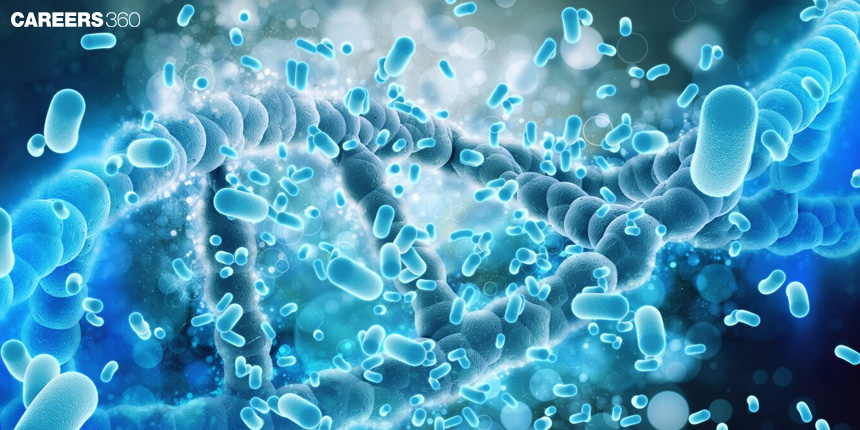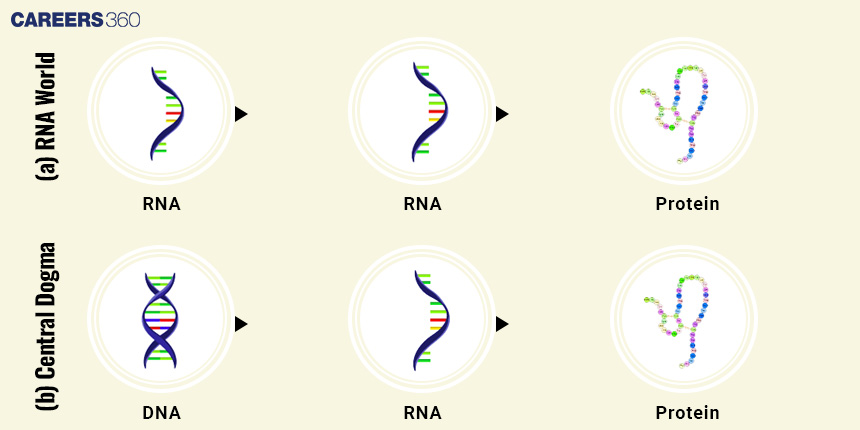RNA World - The Genetic Material and the Origins of Life
The RNA world hypothesis suggests that RNA was the first genetic material to exist before DNA and proteins. RNA is believed to have played a dual role as both a genetic material and a catalyst for biochemical reactions. This theory provides insights into the origin of life, explaining how simple molecules could have evolved into complex living organisms. In this article, RNA world hypothesis, RNA world, and types of RNA are discussed. RNA World is a topic of the chapter Molecular Basis of Inheritance in Biology.
NEET 2025: Mock Test Series | Syllabus | High Scoring Topics | PYQs
NEET Important PYQ's Subject wise: Physics | Chemistry | Biology
New: Meet Careers360 B.Tech/NEET Experts in your City | Book your Seat now
- What is the RNA World Hypothesis?
- What Is RNA World?
- Types of RNA
- RNA as Genetic Material

What is the RNA World Hypothesis?
The RNA World Hypothesis proposes that RNA, not DNA, served as the first genetic material and exerted a central role in the early evolution of life on Earth. It is postulated that an RNA molecule can act as both a storage for genetic information and a bio-catalyst. Understanding the world of RNA is essential to explain the fundamental questions of the origin of life and the emergence of cellular complexity.
What Is RNA World?
According to the RNA world hypothesis, RNA (ribonucleic acid) is a very important molecule that initially performed the living purpose in all living cells. It is a nucleic acid made by nucleotides, such as sugar, a phosphate group and bases(adenine, guanine, cytosine and uracil).
Also Read-
Diagram: RNA Hypothesis
The diagram below shows the flow of genetic information as per the RNA world hypothesis and Central dogma of molecular biology.

Types of RNA
mRNA (Messenger RNA): Just carries genetic information from DNA, through ribosomes, to the synthesis of proteins.
tRNA (Transfer RNA): tRNA transfers amino acids to the ribosome during protein synthesis.
rRNA (Ribosomal RNA): It forms part of the ribosome, and functions in the synthesis of proteins.
RNA as Genetic Material
RNAs are also considered catalysts for major biochemical reactions in primitive cells. The presence of the 2-OH group makes them more reactive and thus a suitable biocatalyst. However, this reactive nature makes them susceptible to degradation and hence unstable. This instability gave a wider spectrum of mutation required for evolution. But being a hereditary material it should have been stable both chemically and structurally.
Eventually, these unstable molecules are now replaced by more stable hereditary molecules, such as DNA. During this evolutionary period, DNA and protein molecules came into view. These substituted RNA as the genetic material and structural component. RNA is a single-stranded hereditary molecule which stores and expresses genetic information. However, their unstable and degrading nature led to the creation of double-stranded DNA molecules that are more stable both chemically and structurally.
Also Read-
Frequently Asked Questions (FAQs)
The RNA World hypothesis posits that RNA served as the first genetic material; the basis for it has been an idea that RNA is proven to possess the ability to store information and at the same time to be able to catalyze chemical reactions and eventually evolve into living organisms on Earth.
RNA is believed to be the first genetic material because it can store genetic information and catalyse, both of these functions are required for the simplest life that existed during that period.
RNA is normally single-stranded in shape, contains ribose sugar, and uses uracil in place of thymine, while DNA is usually double-stranded in shape, contains deoxyribose sugar, and uses thymine.
This supports the fact that the RNA World hypothesis has the quality of RNA catalysis in terms of chemical reactions such as ribozymes and the principal participation of RNA in some indispensable key biological pathways of the cell.
Some of the criticisms that come into play with the RNA World hypotheses are the stability of RNA under prebiotic settings and the ability for RNA self-replication in a manner of nowhere matching abiogenesis.
Also Read
29 Nov'24 09:31 AM
19 Nov'24 09:26 AM
18 Nov'24 06:45 PM
18 Nov'24 09:29 AM
18 Nov'24 09:18 AM
18 Nov'24 09:01 AM
18 Nov'24 08:37 AM
16 Nov'24 03:45 PM

